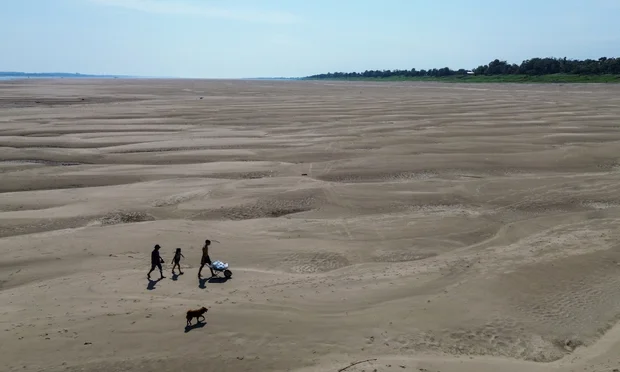A report from the UN environment programme (Unep) has found that the huge cuts in carbon emissions now needed to end the climate crisis mean it is “crunch time for real”.
According to the report, an unprecedented global mobilisation of renewable energy, forest protection and other measures is needed to steer the world off the current path towards a catastrophic temperature rise of 3.1C. This is even as extreme heatwaves, storms, droughts and floods are already ravaging communities with less than 1.5C of global heating to date.
Current carbon-cutting promises by countries for 2030 are not being met, according to the report, and even if they were met, the temperature rise would only be limited to a still-disastrous 2.6C to 2.8C. There is no more time for “hot air”, the report said, urging nations to act at the Cop29 summit in November.
Keeping the international goal of 1.5C within reach was technically possible, said the report, but it required emissions to fall by 7.5% annually until 2035. That means halting emissions equivalent to those of the EU every year for a decade. Delaying emissions cuts only means steeper reductions would be needed in future.
Unep said countries must collectively commit to cut 42% off annual greenhouse gas emissions by 2030 and 57% by 2035 in their next UN pledges, called nationally determined contributions and due in February. Without these pledges, and rapid action to back them up, the 1.5C goal would be gone, the UN said.
However, the head of Unep, Inger Andersen, said it was misguided to fixate only on whether the 1.5C target was kept or not, because every fraction of a degree of global heating avoided would save lives, damage and costs: “Don’t over-focus on a magic number. Keeping temperature as low as possible is where we need to be.”
Read also: UN Climate chief seeks speed in climate finance to prevent collapse of global economy
The finance and technology to slash emissions exists, Andersen said, but “political courage” was needed, particularly from the G20 nations (excluding the African Union) that cause 77% of global emissions.
Andersen said the world’s nations made strong climate promises at the Paris summit in 2015. “Now is the time to live up to that – it’s climate crunch time for real. We need global mobilisation on a scale and pace never seen before, starting right now, or the 1.5C goal will soon be dead and the ‘well below 2C’ target will take its place in the intensive care unit.”
Unep’s last two annual reports highlighted “the closing window” for action and the “broken record” of failed promises. “Now we’re saying, this is it,” she said.
“The irritating thing is technology is there for the grasping, as are the job and economic development opportunities,” Andersen said. “It just takes political courage and some strong leadership.”
The UN secretary general, António Guterres, said: “We’re playing with fire; but there can be no more playing for time. We’re out of time.” He said global heating was supercharging monster hurricanes, bringing biblical floods, turning forests into tinder boxes and cities into saunas.
“Governments must wean us off our fossil fuel addiction: showing how they will phase them out – fast and fairly,” he said, adding that levies on fossil fuels could help pay for climate action.
The Unep report found that faster rollout of solar and wind energy could provide 27% of the emissions cuts needed. “That’s massive and this is a cheap, proven technology – it’s not a gamble to invest in,” Andersen said.
Story was adapted from the Guardian.
